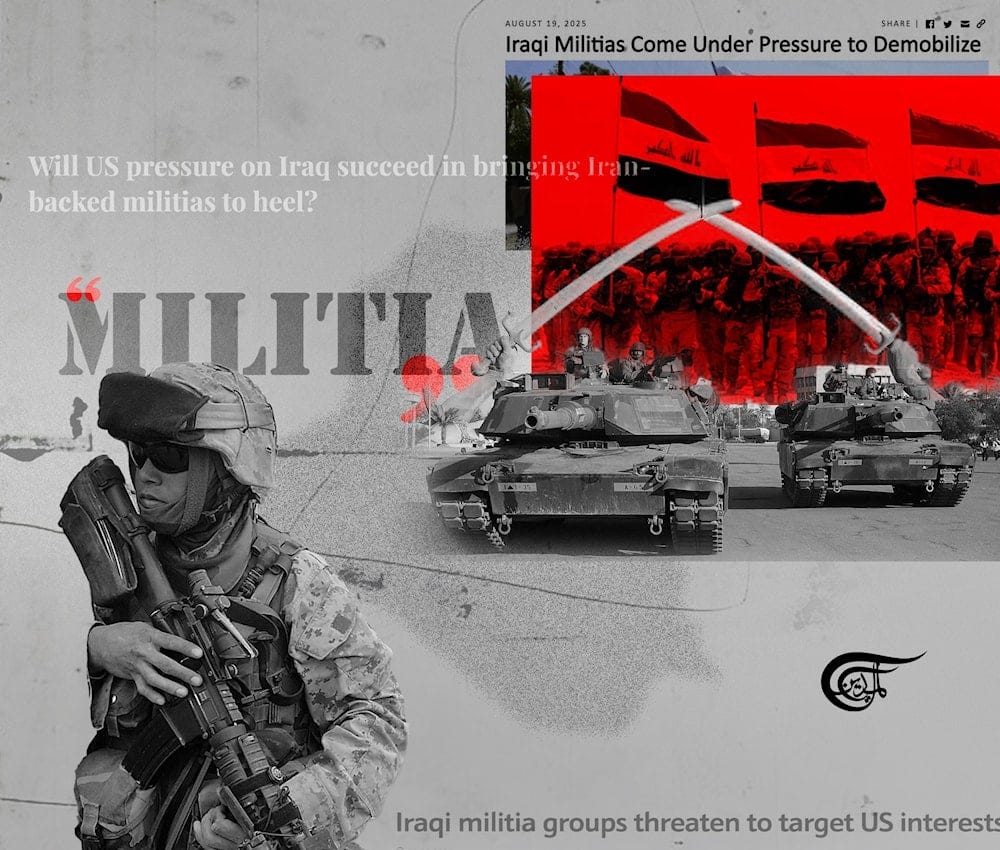The ‘Militia’ Label: Propaganda Media to Delegitimize Hashd al-Shaabi
This framing carries consequences beyond semantics. It shapes public opinion abroad, creating support for ongoing US intervention by portraying Baghdad as incapable of managing its own security.
Iraq, PUREWILAYAH.COM - The struggle over Iraq is not only military or political, but also discursive. Language has long been used as a weapon of war, shaping perceptions, constructing realities, and legitimizing certain narratives over others.
For decades, Western media outlets have consistently labeled Iraqi armed groups as “militias,” often coupled with descriptors like “Iran-backed.”
This framing creates an image of illegitimacy, portraying Iraq as a fractured state in need of foreign intervention. At the same time, armed groups aligned with Western powers are given more neutral or positive labels, such as “troops” or “security forces.”
Erasing Sacrifice Through Terminology
By reducing Iraq’s Popular Mobilization Forces (PMF) to the “militia” label, Western outlets deliberately erase the history of sacrifice made by its members.
Such simplification flattens Iraq’s social, political, and historical realities into a misleading narrative of chaos and foreign dependency.
The word “militia” in English carries strong connotations of illegality and disorder. When applied selectively, it delegitimizes indigenous resistance while legitimizing foreign armed actors.
Consider the example of US and British private military companies such as Blackwater, whose contractors were responsible for atrocities including the 2007 Nisour Square massacre that killed 17 civilians. Western media often framed such crimes as the misconduct of “a few individuals,” avoiding broader indictments of the companies themselves or the states that authorized them.
By contrast, the PMF—who played a decisive role in defending Iraq against ISIS—are portrayed as “illegitimate” despite their integration into Iraq’s state security apparatus.
PMF’s Legal Status vs. Western Delegitimization
The Popular Mobilization Forces emerged in 2014 after a historic fatwa by Iraq’s highest religious authority, Grand Ayatollah Sayyed Ali al-Sistani, calling Iraqis to defend their country following ISIS’s capture of Mosul.
By 2016, the PMF were officially incorporated into Iraq’s security apparatus, making them a legitimate state force. Yet Western reporting frequently reduces them to “Iran-backed militias” or “Shi’a militants,” disregarding their legal status and broad composition, which includes Sunni, Shi’a, and Christian factions.
During the battle of Mosul in 2016, for example, Western outlets such as the BBC and Time Magazine described Iraqi fighters as “Shia militiamen” while neglecting to acknowledge the PMF by name. This narrative erased their role as a key component of Iraq’s national defense structure.
Selective Reporting and Political Bias
The distortion is most evident in how operational victories are reported. When the PMF liberated territories from ISIS, headlines rarely acknowledged their achievements. Instead, coverage focused on political controversy or alleged foreign influence.
In the 2015 liberation of Tikrit, ISIS’s defeat was largely credited in Western media to US-led coalition airstrikes, while the PMF’s central role in leading the ground operation was marginalized.
Similarly, when PMF units helped secure Baghdad during ISIS infiltrations, their role was framed as “sectarian” or “chaotic,” despite their success in stabilizing the capital.
This pattern ensures that victories appear dependent on Western intervention, while the sacrifices of Iraqi fighters are overshadowed or reframed as problematic.
Semantics of “Militia”
The choice of words is neither accidental nor neutral. In Western narratives, US forces in Iraq are described as “peacemakers” or “security providers,” while Iraqi Resistance fighters are branded “militants” or “militias.”
This framing carries consequences beyond semantics. It shapes public opinion abroad, creating support for ongoing US intervention by portraying Baghdad as incapable of managing its own security.
The “militia” label, therefore, becomes another tool of war—a strategic linguistic weapon used to delegitimize Iraq’s Popular Mobilization Forces and justify external control.
Recognizing Language as Warfare
Understanding the politics of language is essential to understanding Iraq’s modern history. The PMF, born of a grassroots call to defend Iraq from ISIS, legally integrated into the state, and supported by diverse communities, are far more than the “militia” label imposed upon them.
Western media’s selective terminology not only distorts reality but also serves as a tool of intervention.
Recognizing language as part of the battlefield is key to resisting misrepresentation and restoring the rightful narrative of Iraq’s struggle for sovereignty and security. (PW)
Source: Al-Mayadeen


